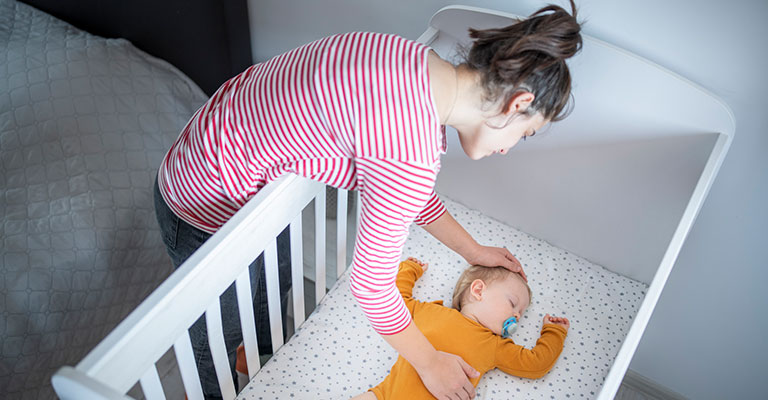Reviewed by Dr. Jennifer Trachtenberg — May 2025
We all know that babies need to get a lot of sleep. Parents often have many questions about how they can make sure that their baby is sleeping safely.
When is it safe for a baby to sleep with a blanket?
At 12 months you can add a blanket to your baby’s crib.
When is it safe for my baby to sleep on their stomach?
You should always put your baby to sleep on their back, but sometimes babies will naturally roll over onto their stomachs. Babies can sleep on their stomachs only after they can roll over both ways, which usually happens around six months.
If your baby cannot roll over both ways and they migrate to their belly at night, gently adjust them back onto their back.
Is it safe for my baby to sleep in a swing?
No. It’s safest for babies to sleep on a flat, firm surface, such as a crib or a blanket on the floor during naps. If your baby falls asleep in their swing, gently move them to their crib.
Is it safe for babies to sleep in a car seat?
It is perfectly fine for your baby to sleep in a car seat for short periods of time. Many parents use a short car ride to help babies fall asleep. However, it is safest for your baby to sleep in their crib with a flat, fitted sheet. If your baby is asleep in their car seat when you arrive home, it is recommended (and safest) to transfer them to their crib.
Is it safe for babies to sleep on their side?
No, babies should sleep flat on their backs until they can roll over both ways.
Are sleep sacks safe for babies who can roll over?
Yes, wearable sleep sacks are a safe and cozy alternative to blanket swaddling for your newborn. But as your baby grows and starts showing signs of rolling over, which can happen as early as 2 months, it’s time to make a switch.
At that stage, you’ll want to stop using any sleep sacks that compress the arms, chest, or body. Instead, look for a sleep sack that lets your baby move freely. This gives them the freedom to roll safely when they’re ready.
An important note: avoid using weighted sleep sacks. These can make it harder for your baby to move or roll, which can be unsafe for them.
When is it safe for a baby to sleep with a pacifier?
It’s safe for your baby to sleep with a pacifier from day one, if bottle feeding. Evidence suggests that the use of a pacifier at this age can reduce the risk of sudden infant death syndrome (SIDS).
Tip: if your baby uses a pacifier, you can prevent sleep disruptions by placing an extra pacifier in their crib at night. This will make it easier for them to find one if they wake up and reach out for one.
Is it safe to co-sleep?
No. Co-sleeping, also known as bed-sharing, is not safe for your baby. If you co–sleep, your baby can get tangled in the sheets, suffocate on a pillow, or you may roll over them, injuring your baby. Instead of co-sleeping, consider room-sharing.
What is room sharing?
Room sharing with your baby is when you keep your baby’s crib in your room.
What are the benefits of room sharing?
There are many benefits:
- By keeping your baby in your room, you make night feeding far easier. You walk less and therefore wake up less.
- The American Academy of Pediatrics recommends room sharing for at least the first six months of age. Room sharing has been shown to reduce the risk of sudden infant death syndrome (SIDS) by as much as 50%.
What is sudden unexpected infant death (SUID)?
It’s the death of a baby where the cause isn’t clear. It includes SIDS, accidental suffocation and strangulation in bed, and other deaths from unknown causes.
What is SIDS?
Sudden infant death syndrome is the sudden and unexplained death that happens before the age of one with no known underlying reason. Though scary, SIDS is rare, about 1 in 1,000, and there are ways to reduce the risk.
How can I help prevent SIDS?
- Avoid all alcohol, marijuana, opioids, and illicit drug use during pregnancy and after birth.
- Keep them sleeping flat on their backs on a firm mattress. If your baby rolls onto their stomach in their sleep and they cannot roll over both ways while awake, go in and gently turn them over to place them back on their back.
- Keep their bed clear of loose sheets, blankets, toys, pillows, bumpers and anything else except for your baby.
- Room sharing is good. Bed sharing, or co-sleeping, is dangerous for your baby. Your baby should always be in their own safe sleeping space and not in your bed.
- Avoid overheating. Dress them in only one more layer than you’re wearing and keep them in a room between 68 to 72 degrees Fahrenheit.
- Hold your baby against your skin. It’s also a great bonding experience.
- Chestfeed, if you can.
- Use pacifiers when they’re ready for them.
- Modern baby monitors claim to monitor breathing and can alert you if your baby is crying. There is NO monitor that can alert you to SIDS or prevent SIDS.
Progyny is here for you. If you have any questions, please contact your Progyny Care Advocate for support.
Disclaimer: The information provided by Progyny is for educational purposes only and is not medical advice. Always consult a qualified healthcare provider for medical guidance.
